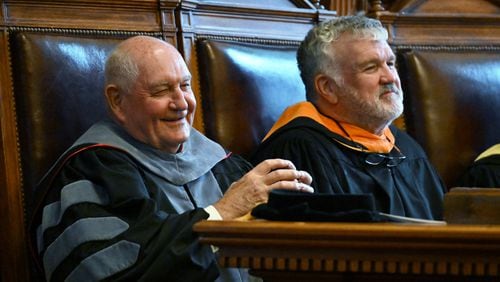Rising costs will catch up with Georgia residents who attend a state college or university, with in-state tuition set to rise 2.5% in the fall.
Students from outside Georgia will pay even more after the state Board of Regents broke a half-decade trend Tuesday, voting to raise tuition at all 26 campuses, and fees for online students.
They also concurred with Chancellor Sonny Perdue’s request to continue the waiver on admissions testing, with only the three most selective campuses continuing to require an ACT or SAT score. Perdue suggested that could change after next year, though.
Tuition had not risen since a 2.5% increase in fall 2019, except at Middle Georgia State University. Students there will see another increase this fall, along with the other 25 state campuses.
In addition to the 2.5% rise for in-state tuition, students from outside Georgia will pay 5% more. The regents also established a new tuition tier for foreign students, setting it 2% above what out-of-state students pay.
The fall 2024 semester tuition at Georgia State University, which has higher enrollment than any school in the system with about 50,000 students from every state and 150 countries, will be $4,590 for full-time, in-state students and $14,700 for out-of-state students. Foreign students will pay $14,970. For students at the University of Georgia, the state’s flagship campus, it will be $5,017 in-state, $15,136 out-of-state and $15,424 out-of-country. Students at Georgia Tech, with its highly ranked engineering school, will be charged $5,256 in-state, $16,469 out-of-state and $16,783 out-of-country.
Online students at 20 institutions will see higher fees, too. Those had been waived at many campuses but will now be set at the cost of technology plus half the amount that in-person students pay.
Tracey Cook, the University System of Georgia’s chief fiscal officer, said rising costs for food, technology, utilities, insurance and salaries necessitated these increases.
“We must at times increase tuition to maintain a consistent standard of quality,” she said. Perdue said after the regents approved the increases that anyone who goes to a grocery store, a gas station or a restaurant knows that prices have been rising. The University System is committed to doing more with less, he said, “but at some point, you do less with less.”
Credit: Eric Stirgus
Credit: Eric Stirgus
Not surprisingly, several students interviewed at Georgia State’s campus in downtown Atlanta were disappointed by the board’s decision.
“This is going to be hard for us,” said Raiyan Haque, 20, a freshman computer science major from Bangladesh. Haque said he’ll look for internships and additional scholarships to pay for his tuition and fees.
Anna Lappin, 19, a first-year student from Fort Worth, Texas, said she might transfer to one of Georgia State’s less expensive campuses to cut costs. Lappin said she’s paying $15,000 this semester for tuition, housing and fees. “That’s insane,” she said of the increases.
Credit: Eric Stirgus
Credit: Eric Stirgus
Ruth Fortuchang, 19, a junior psychology student from Maryland, said the board’s decision is an “unfortunate situation for everybody in general.”
“I feel like school isn’t as affordable as it should be,” Fortuchang said.
System officials credited state leaders with a budget boost for next year. Lawmakers approved about $200 million more in state funding before winding down their annual year legislative session last month.
Gov. Brian Kemp has not yet signed the budget, but the version approved by the General Assembly wasn’t very different from what he’d proposed. Among the biggest line items: restoring the $66 million lawmakers cut last year.
The regents maintained their half-decade waiver on admissions testing at all but the most rigorous campuses, after relaxing the requirement in 2020, during the first year of the COVID-19 pandemic. Only those seeking admission to the University of Georgia, Georgia Tech and Georgia College & State University will still have to submit scores this fall.
Perdue said that with enrollment recovering, it was important to send a “signal” about the test-optional stance at most of the state’s campuses. “I think this is currently the wise thing to do,” he said.
However, he also said he’d talked with the presidents of several campuses, including Georgia State and Kennesaw State, about resuming testing after next year.
“They feel like with a two-year runway in the academic year of ‘26 they would be prepared to go back to academic testing,” Perdue said. He said the best predictor of academic success is a combination of test scores and grade-point averages, adding that some are suspicious about the GPAs they’ve been seeing.
“I think there’s some concern, over the desire for HOPE scholarship and others, that we’re seeing some grade inflation in the state,” Perdue said.
Many academic institutions nationwide dropped their testing requirements during the pandemic, including Ivy League universities, such as Harvard. But Harvard recently reinstated the requirement, following peer institutions, including Yale.
More than 1,800 schools will remain test-optional in the fall, the National Center for Fair & Open Testing announced last week. Last year, the group tallied 2,000 colleges and universities in that category.
AJC education editor Eric Stirgus contributed to this report.









